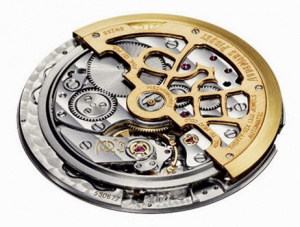Calibre 2120: Difference between revisions
From Chronopedia
Created page with "=='''Audemars Piguet Calibre 2120''' thumb|AP 2120" |
|||
| (One intermediate revision by the same user not shown) | |||
| Line 1: | Line 1: | ||
=='''Audemars Piguet Calibre 2120''' | =='''Audemars Piguet Calibre 2120'''== | ||
[[File:AP2120.jpg|thumb|AP 2120]] | [[File:AP2120.jpg|thumb|AP 2120]] | ||
Calibre 2120 was introduced in 1967 as the result of a project led by [[Jaeger-LeCoultre|Jaeger-LeCoultre]], with the technical contribution of [[Audemars Piguet]] and the funding of [[Audemars Piguet]], [[Patek Philippe]] and [[Vacheron Constantin|Vacheron Constantin]], for the creation of an ultra-thin automatic movement. The joint effort produced the Jaeger-LeCoultre [[Calibre 920]], a highly innovative and reliable movement, that each of the three funding customers renamed and customized (the Patek Philippe 28-255 C was used for the Nautilus while the Vacheron Constantin 1120 powered the 222 model). | |||
Used in: | |||
[[Audemars Piguet Royal Oak]] | |||
Latest revision as of 19:21, 4 April 2020
Audemars Piguet Calibre 2120

Calibre 2120 was introduced in 1967 as the result of a project led by Jaeger-LeCoultre, with the technical contribution of Audemars Piguet and the funding of Audemars Piguet, Patek Philippe and Vacheron Constantin, for the creation of an ultra-thin automatic movement. The joint effort produced the Jaeger-LeCoultre Calibre 920, a highly innovative and reliable movement, that each of the three funding customers renamed and customized (the Patek Philippe 28-255 C was used for the Nautilus while the Vacheron Constantin 1120 powered the 222 model).
Used in:
Audemars Piguet Royal Oak
